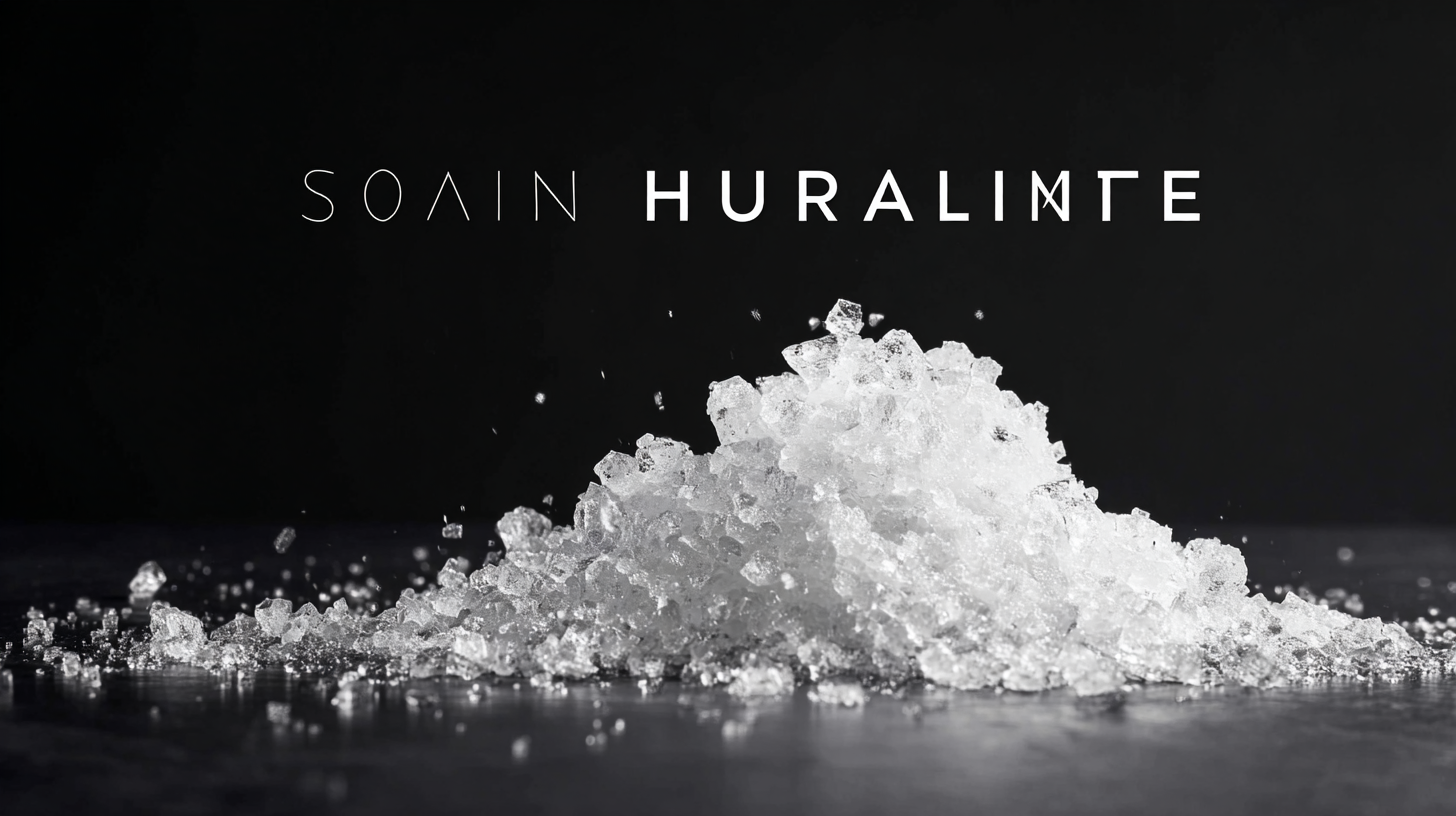
How to Choose the Best Sodium Hyaluronate for Your Skincare Routine with Expert Insights
In the realm of skincare, Sodium Hyaluronate stands out as a powerhouse ingredient renowned for its unparalleled hydrating properties. As a derivative of hyaluronic acid, it boasts the unique ability to attract and retain moisture in the skin, making it an essential component for those seeking a plump and youthful complexion. However, with a myriad of products containing Sodium Hyaluronate flooding the market, choosing the right one can be a daunting task.

To navigate this sea of options, it’s crucial to understand the various applications of Sodium Hyaluronate in skincare, alongside expert insights that can guide you towards making informed decisions. This blog aims to provide a comprehensive overview of Sodium Hyaluronate, exploring its benefits, industry applications, and tips on how to effectively incorporate it into your skincare routine for optimal results.
Understanding Sodium Hyaluronate: What It Is and Why It Matters in Skincare
 Sodium hyaluronate, a salt form of hyaluronic acid, is a powerful ingredient that has garnered significant attention in the skincare world. It is naturally found in our bodies, particularly in the connective tissues, skin, and cartilage, where it plays a crucial role in retaining moisture. This hydrating ability has made sodium hyaluronate a vital component in many skincare products, providing a plumping effect and helping to reduce the appearance of fine lines and winkles.
Sodium hyaluronate, a salt form of hyaluronic acid, is a powerful ingredient that has garnered significant attention in the skincare world. It is naturally found in our bodies, particularly in the connective tissues, skin, and cartilage, where it plays a crucial role in retaining moisture. This hydrating ability has made sodium hyaluronate a vital component in many skincare products, providing a plumping effect and helping to reduce the appearance of fine lines and winkles.
What sets sodium hyaluronate apart is its ability to hold up to 1,000 times its weight in water, making it incredibly effective for hydration. When applied topically, it penetrates the skin more easily than its larger counterpart, hyaluronic acid, thanks to its smaller molecular size. This allows for deeper hydration and a smoother complexion. Beyond hydration, sodium hyaluronate also helps strengthen the skin barrier, increase elasticity, and improve overall skin texture. Understanding these benefits can help you make informed choices when selecting products for your skincare routine, ensuring you reap the maximum rewards from this .
Exploring Alternatives to Sodium Hyaluronate: Benefits and Drawbacks
When considering alternatives to sodium hyaluronate, it's essential to explore other hydration-boosting ingredients that can enhance your skincare routine. For instance, glycerin is a popular substitute that draws moisture to the skin and helps maintain hydration levels. It is non-comedogenic and suitable for various skin types, making it a versatile option. However, glycerin may not provide the same level of deep hydration as sodium hyaluronate due to its molecular weight, which can limit its penetration into the skin.
Another noteworthy alternative is squalane, a plant-derived oil that mimics the skin's natural oils. Squalane provides excellent moisture and helps form a protective barrier to lock in hydration. Its lightweight texture makes it suitable for all skin types, including oily and acne-prone skin. Nonetheless, while squalane is an effective moisturizer, it doesn’t have the same intense water-attracting properties as sodium hyaluronate, which could lead to a different feel and level of hydration. Understanding the benefits and drawbacks of these ingredients can help you tailor your skincare regimen to meet your specific skin needs.
Benefits and Drawbacks of Sodium Hyaluronate vs. Alternatives
Key Ingredients to Look for in Sodium Hyaluronate Products
When selecting the best sodium hyaluronate for your skincare routine, it’s crucial to look for specific key ingredients that enhance the product's efficacy. Sodium hyaluronate is a powerful humectant known for its ability to retain moisture, but not all products are created equal. Seek formulations that include additional skin-conditioning agents such as glycerin or fatty acids, which work in tandem with sodium hyaluronate to improve skin hydration and barrier function. Antioxidants like vitamin E can further enrich the formula, providing extra protection against environmental stressors.
Recent developments in ingredient safety highlight the importance of sourcing high-quality, food-grade materials in skincare. Reports have surfaced regarding products with improperly high concentrations of sodium hyaluronate, emphasizing the need to check regulatory compliance. This calls for a careful examination of not just the ingredient list, but also the brand’s transparency regarding sourcing and manufacturing processes. By prioritizing products that adhere to established safety standards, consumers can confidently integrate sodium hyaluronate into their skincare arsenal, ensuring both efficacy and skin health.
Expert Tips on Selecting the Right Sodium Hyaluronate for Your Skin Type
When selecting the right sodium hyaluronate for your skincare routine, understanding your skin type is crucial. Sodium hyaluronate, a derivative of hyaluronic acid, comes in various molecular sizes, which determines its absorption and efficacy. According to a report by the International Journal of Cosmetic Science, smaller molecules penetrate deeper into the skin, providing hydration at a cellular level, which is particularly beneficial for those with dry or dehydrated skin.
For oily or acne-prone skin types, lighter formulations with higher molecular weights may be preferable. These products deliver moisture without the risk of clogging pores. A study published in the Journal of Clinical and Aesthetic Dermatology shows that individuals with oily skin benefit from using sodium hyaluronate in conjunction with other active ingredients, such as salicylic acid, to maintain moisture balance while controlling excess oil production. By tailoring your choice of sodium hyaluronate to your specific skin needs, you can enhance hydration and overall skin health effectively.
Comparing Sodium Hyaluronate with Other Hydrating Agents in Beauty Products
 Sodium hyaluronate, the salt form of hyaluronic acid, is a powerful humectant revered in the skincare industry for its ability to attract and retain moisture. When comparing sodium hyaluronate to other hydrating agents, such as glycerin and urea, it shows remarkable efficacy. A 2021 report from the Journal of Cosmetic Dermatology indicated that sodium hyaluronate could hold up to 1,000 times its weight in water, making it significantly more effective than glycerin, which retains only a fraction of that moisture. This characteristic helps to visibly plump the skin and reduce the appearance of fine lines.
Sodium hyaluronate, the salt form of hyaluronic acid, is a powerful humectant revered in the skincare industry for its ability to attract and retain moisture. When comparing sodium hyaluronate to other hydrating agents, such as glycerin and urea, it shows remarkable efficacy. A 2021 report from the Journal of Cosmetic Dermatology indicated that sodium hyaluronate could hold up to 1,000 times its weight in water, making it significantly more effective than glycerin, which retains only a fraction of that moisture. This characteristic helps to visibly plump the skin and reduce the appearance of fine lines.
When selecting sodium hyaluronate, consider its molecular weight—lower molecular weight versions penetrate deeper into the skin, providing long-lasting hydration, while higher molecular weights form a barrier on the surface that can prevent moisture loss. A study by the International Journal of Cosmetic Science found that products containing varying molecular weights of sodium hyaluronate showed impressive results in skin hydration levels after just four weeks of consistent use.
Tips: Look for products that combine sodium hyaluronate with other beneficial ingredients like peptides or antioxidants for enhanced skin health. Additionally, always apply hydrating products on damp skin to maximize moisture absorption. Consider your skin type: those with oily skin might prefer lighter formulations, while drier skin types could benefit from richer textures.
